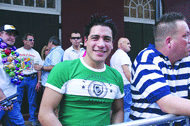After Half-Year of Heartbreak, New Orleans Rises for Annual Pre-Lenten Rites
Katrina might have wiped out an enormous portion of New Orleans, but that didn’t stop the city from throwing its annual Mardi Gras celebration. According to most locals, the parade was only half as full as previous celebrations, but most agreed that it was a needed respite from the city’s recent troubles.
The world took notice, and more than 1,200 domestic and foreign media organizations applied to photograph or film Fat Tuesday’s ending festivities. According to Sandy Shilstone, president of the New Orleans Tourism Marketing Corporation, many were journalists more accustomed to war zones than party zones.
“I was surprised by the places they used to cover, and the lines of questioning, but happy that they’re here to see how we’re doing,” she told Gay City News.
It made her more confident of the city’s decision, in spite of financial problems, to hold Mardi Gras.
“It wouldn’t be New Orleans without it,” Shilstone said.
As usual, gays and lesbians made up a significant portion of the festivities, blending in with official marches and holding their own events. The Fat Monday Luncheon, held every year since 1949, and the city’s oldest gay Mardi Gras event, declared an Out-of-Town Queen and a Local Queen, Charles Rector and Joe Wharton, respectively.
Tuesday morning, the Society of St. Ann’s, named for the French Quarter street lined with gay bars, held its bar-hopping parade beginning along the waterfront and ending on Bourbon Street. By noon, more than enough crazy men and women had gathered to hold the Bourbon Street Awards fashion show for best Mardi Gras costumes, held in front of the gay club Oz. There and throughout the city, many costumes had anti-FEMA and anti-Bush themes.

With half the population of the city still displaced, gay historian Roberts Batson, who runs the city’s gay walking tour, indicated that “the gay community reflected the larger community. All problems in the city start with housing.”
Whether gay or straight events, he said, “everything is scaled down in the city” largely as a reflection of fewer people who live and work nearby. Parades had fewer floats, fewer participants, and ran more quickly than in previous years. With fewer police and sanitation workers, clean-up occurred less often, allowing party debris, mostly the bright beads thrown from balcony windows, to accumulate on the streets.
New Yorkers, familiar with the damage a catastrophe can wreak on a city, came out in support of New Orleans. Tony Gambino, promoter of the Gay College Party event at Heaven, in Chelsea, brought down 22 employees to work with a New Orlean’s gay bar, the Bourbon Street Pub, for a queer Mardi Gras party.
“I’m excited and we looked forward to it. We know the city needs the money,” Gambino said, explaining that the Gay College Party he’s been doing in New York for 11 years has been holding at-large events at the Pub for several years during Mardi Gras.
He and his team were there for a week, and he was able to tour some parts of the destroyed city, more than half of which remains unoccupied.
“Passing some of it, like Charles Street, it was a little disturbing,” Gambino said. “It looked like a ghost town.”
Like most visitors to the city though, he remains hopeful.

“I am very happy we came and I think everything is going to be alright here.”
Bianca del Rio, a New Orleans-born drag entertainer who moved to New York after Katrina to work at Heaven, came with the team. She returned to co-host the Bourbon Street Awards, a gay Mardi Gras fashion show held Tuesday, along with local legend Blanche Debris. Happy to be back and in the thick of the celebrations, Del Rio said, “There’s nothing worth doing more than over-doing. This city is always this way.”
As for the gay community, she said, “They’re up and running. They’ve been our biggest cheerleaders.”
“The attitudes here are amazing,” he said.
Rosas expected to find only sadness after the hurricane, but said, “The locals, they are starting to look upbeat.”
Historian Batson would agree and is happy that the world is paying attention to the city at this crucial moment. In spite of the destruction of the city, he said, “Local people have really been out on the street. We really need this party.”

gaycitynews.com


































